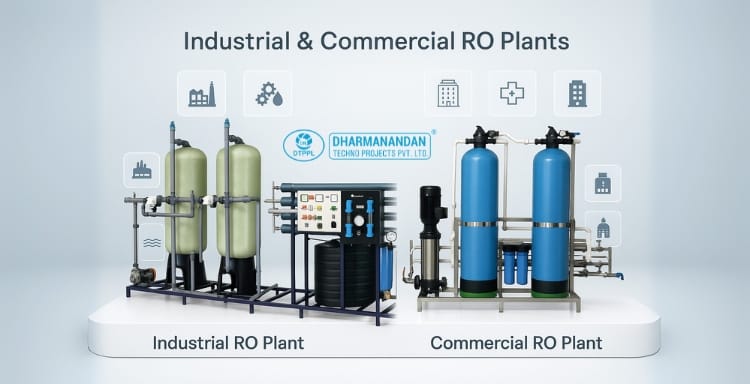
Table of Contents
Industrial & Commercial RO Plants FAQs
July 15, 2025
What is an Industrial RO Plant?
An Industrial RO Plant is a large-scale water filtration system designed to treat and purify water for industrial purposes. It uses reverse osmosis technology to remove impurities, such as salts, heavy metals, and contaminants, from water, making it suitable for industrial applications like manufacturing, food processing, and pharmaceutical industries.
What is the difference between Industrial and Commercial RO Plants?
The primary difference lies in the scale and application. Industrial RO plants are built to serve large industries that require high volumes of purified water for processes like cooling, boiler feed water, or washing. Commercial RO plants, on the other hand, are typically used by businesses like bottled water companies, restaurants, or retail establishments that need water purification for smaller-scale operations.
What are the key components of an Industrial RO Plant?
An Industrial RO plant consists of:
- Pre-treatment system (like filtration, softening)
- RO membrane for filtration
- High-pressure pumps to push water through the membrane
- Post-treatment systems for balancing pH, adding minerals, etc.
- Storage tanks for clean water
- Control panels for monitoring and automation
How does a Commercial RO Plant work?
A Commercial RO plant operates by forcing water through a semi permeable membrane under pressure, filtering out impurities and contaminants. The process includes pre-filtration (to remove larger particles), reverse osmosis, and post-filtration for further purification, ensuring the water meets commercial quality standards.
What are the benefits of using an Industrial RO Plant?
The benefits of an Industrial RO plant include:
- High-quality purified water for industrial processes
- Reduced scaling and corrosion in machinery
- Lower energy consumption compared to other water treatment methods
- Improved water efficiency and reuse
- Compliance with industrial water standards and regulations
How much space is required to set up an Industrial RO Plant?
The space requirement for an Industrial RO Plant depends on the plant’s capacity, the type of industry it serves, and the equipment needed. Larger plants require more space for the membrane systems, pre-treatment filters, storage tanks, and associated machinery.
How much water can a Commercial RO Plant purify?
The capacity of a Commercial RO plant can range from a few hundred liters per hour (LPH) to several thousand LPH, depending on the size and purpose of the plant. For instance, a small bottled water business may use a 5000 LPH system, while larger setups might require 10,000 LPH or more.
What is the average maintenance cost of an Industrial RO Plant?
The maintenance cost of an Industrial RO plant includes expenses for membrane replacement, cleaning, energy consumption, and routine inspections. The cost will vary based on the size of the plant and the quality of the raw water. Generally, maintenance costs represent 10-15% of the overall operational cost annually.
Can an Industrial RO Plant be customized for specific needs?
Yes, Industrial RO plants can be customized based on the specific needs of the industry, such as water volume, quality requirements, and space constraints. Customizations can include specialized pre-treatment processes, the addition of mineral filters, or designing a plant for specific contaminants removal.
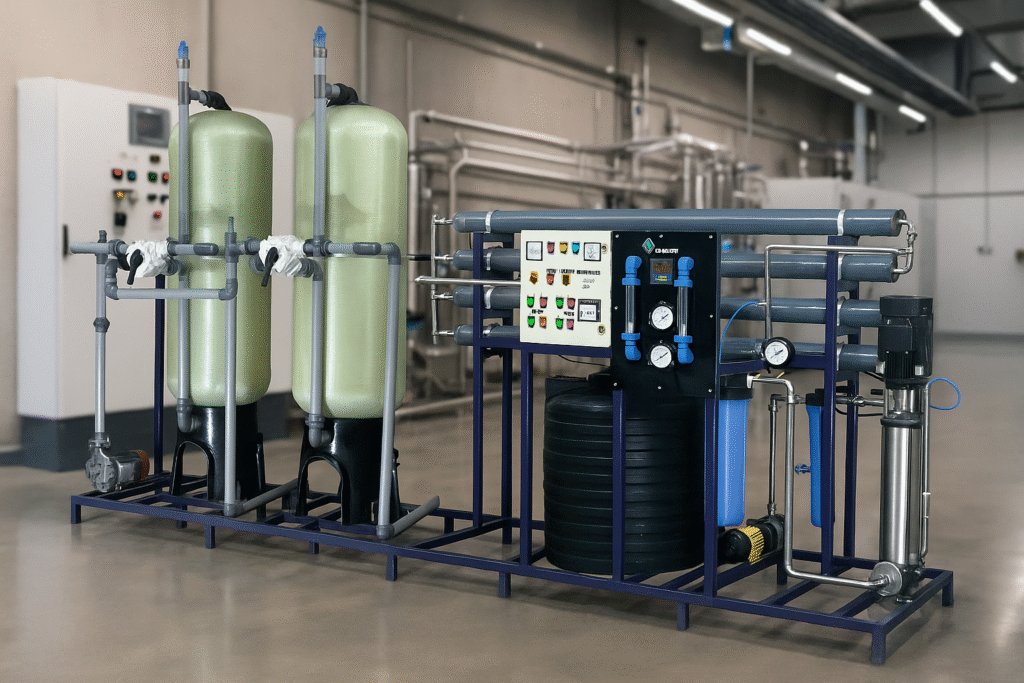
What industries benefit from Industrial RO Plants?
Industrial RO plants are beneficial for industries that require high-quality water for manufacturing and production processes. Key industries include:
- Food & beverage production
- Pharmaceuticals
- Textile & dyeing
- Chemical & petrochemical
- Power plants
- Electronics manufacturing
Is it necessary to have pre-treatment before the RO process in commercial plants?
Yes, pre-treatment is essential in commercial RO plants to remove large particles, chlorine, hardness, and other contaminants that could damage the RO membranes and reduce the plant’s efficiency. Pre-treatment typically involves sediment filtration, carbon filtration, and softening.
How do I choose the right Commercial RO Plant for my business?
When selecting a Commercial RO plant, consider factors like:
- Water quality and the level of impurities in your raw water
- Water demand for your business operations
- Cost of installation, operation, and maintenance
- Required certifications for your industry
- Energy efficiency of the plant
What is the cost of setting up a Commercial RO Plant?
The cost of setting up a Commercial RO Plant depends on several factors like the capacity, complexity, and location of the plant. The price range can vary, so it’s best to contact Dharmanandan Techno Projects Pvt. Ltd. for the most accurate and competitive price for your commercial RO plant setup.
How often should I replace the RO membranes in an Industrial RO Plant?
RO membranes should be replaced every 2-3 years, depending on the water quality, usage, and maintenance practices. Regular cleaning and proper pre-treatment can extend the lifespan of the membranes.
What are the operational costs of a Commercial RO Plant?
The operational costs of a Commercial RO plant typically include energy consumption, water wastage, membrane replacement, labor, and maintenance. Operational costs can range from 20-30% of the total cost, depending on the plant’s scale and efficiency.
Can an RO plant be used for bottled water production?
Yes, an RO plant is ideal for bottled water production. It ensures the water is purified, free from contaminants, and meets safety standards for bottling and sale.
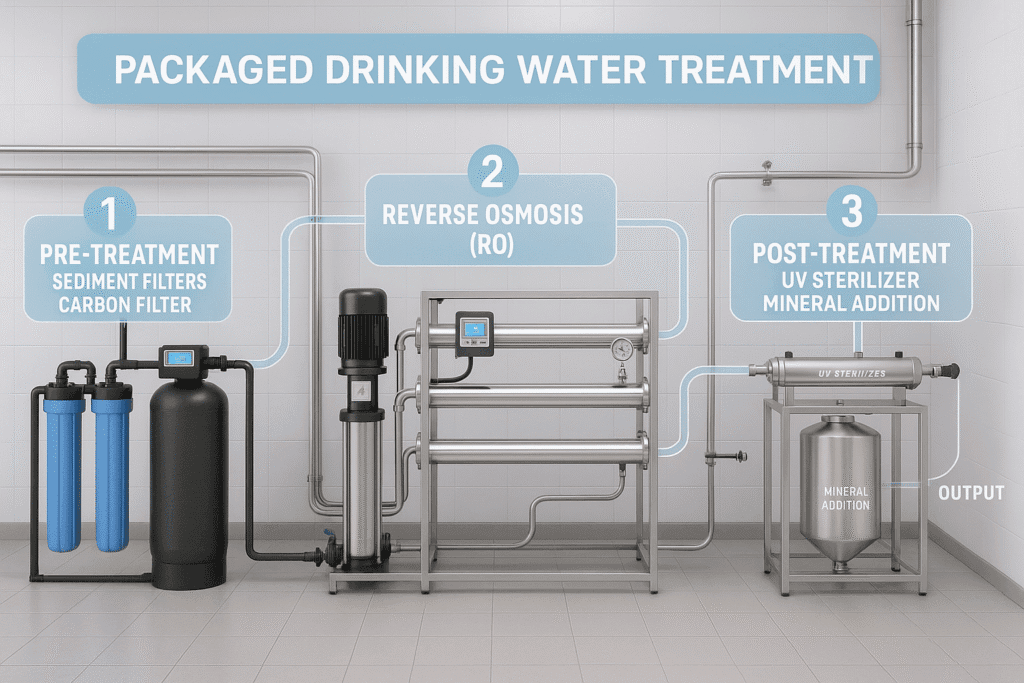
What types of water treatment are needed for packaged drinking water?
For packaged drinking water, the water typically goes through multiple stages:
- Pre-treatment (sediment filters, carbon filters)
- Reverse Osmosis (RO filtration)
- Post-treatment (mineral addition, UV sterilization)
How do I calculate the cost of running an RO plant for my business?
To calculate the cost of running an RO plant, consider factors such as:
- Energy consumption
- Labor costs
- Membrane replacement
- Maintenance expenses
- Water treatment chemicals (if needed)
What are the common challenges in setting up an Industrial RO Plant?
Common challenges include:
- High initial capital investment
- Water quality issues affecting the performance of the RO membranes
- Energy consumption
- Regular maintenance and replacement of parts
- Meeting regulatory requirements for water quality
Is it possible to get a fully automated RO plant for commercial use?
Yes, fully automated RO plants are available for commercial use, offering automated cleaning, monitoring, and water production processes. This reduces human intervention and operational costs.
What is the process involved in setting up an RO plant?
Setting up an RO plant involves several stages:
- Site assessment: Evaluating the water source, space, and infrastructure.
- Design: Creating a custom layout based on water demand and plant capacity.
- Installation: Setting up the filtration system, RO membranes, pumps, and tanks.
- Testing & Commissioning: Ensuring the system works effectively and meets required water quality standards.
- Post-setup monitoring: Regular checks and maintenance to ensure continuous performance.
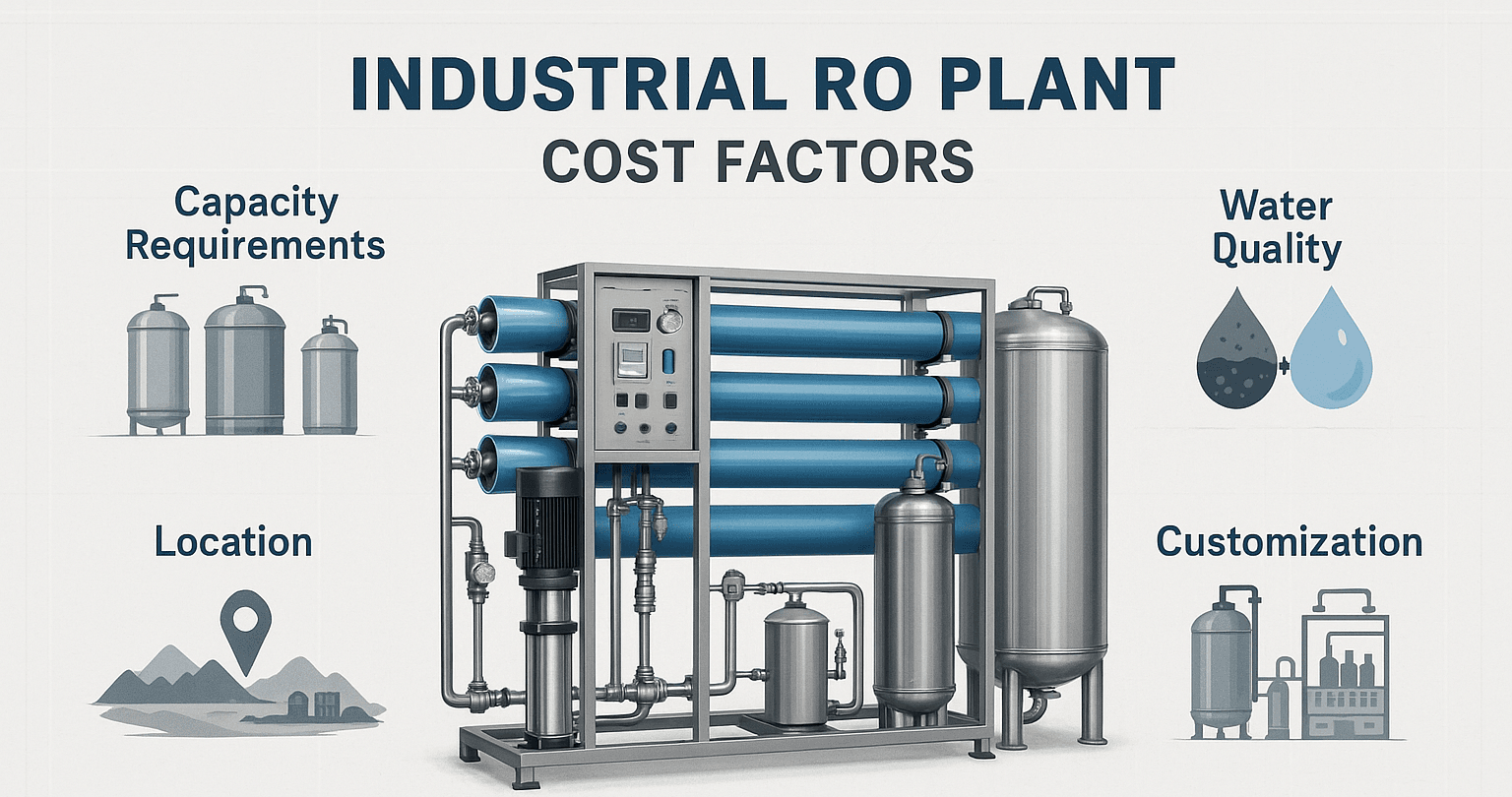
What factors affect the cost of setting up an RO plant in India?
The cost of setting up an RO plant in India depends on several factors, such as:
- Capacity requirements: Larger plants for industrial purposes cost more.
- Water quality: Higher levels of contaminants require more advanced filtration.
- Location: Costs can vary based on geographical and logistical factors.
- Customization needs: Additional features like pre-treatment, post-treatment, or packaging lines can add to the cost.
For accurate and detailed pricing, contact Dharmanandan Techno Projects Pvt. Ltd. for the best quote.
What is a packaged drinking water RO plant, and how does it differ from other RO plants?
A packaged drinking water RO plant is designed specifically for producing purified water that is packaged in bottles or pouches for commercial sale. It has additional features such as:
- Post-treatment systems for adding essential minerals.
- Filtration units for microbial removal.
- UV treatment to ensure water safety.
Unlike industrial RO plants, packaged water systems are more focused on meeting stringent health and safety standards for drinking water.
For a customized solution, contact Dharmanandan Techno Projects Pvt. Ltd.
What maintenance is required for an Industrial RO Plant?
Routine maintenance for an Industrial RO plant includes:
- Cleaning of pre-filters and membranes to avoid clogging.
- Regular membrane replacement (every 2-3 years depending on usage).
- System calibration and checks for pressure and flow.
- Monitoring water quality to ensure optimal performance.
Effective maintenance ensures long-term efficiency and reduced operational costs. Contact Dharmanandan Techno Projects Pvt. Ltd. for maintenance support.
Can an Industrial RO Plant be used for multiple applications?
Yes, Industrial RO plants are versatile and can be used for:
- Industrial processes (e.g., in chemical or pharmaceutical industries).
- Bottled water production.
- Food & beverage processing.
- Cooling systems in power plants.
Each application may require specific adjustments in the plant’s setup or water treatment stages.
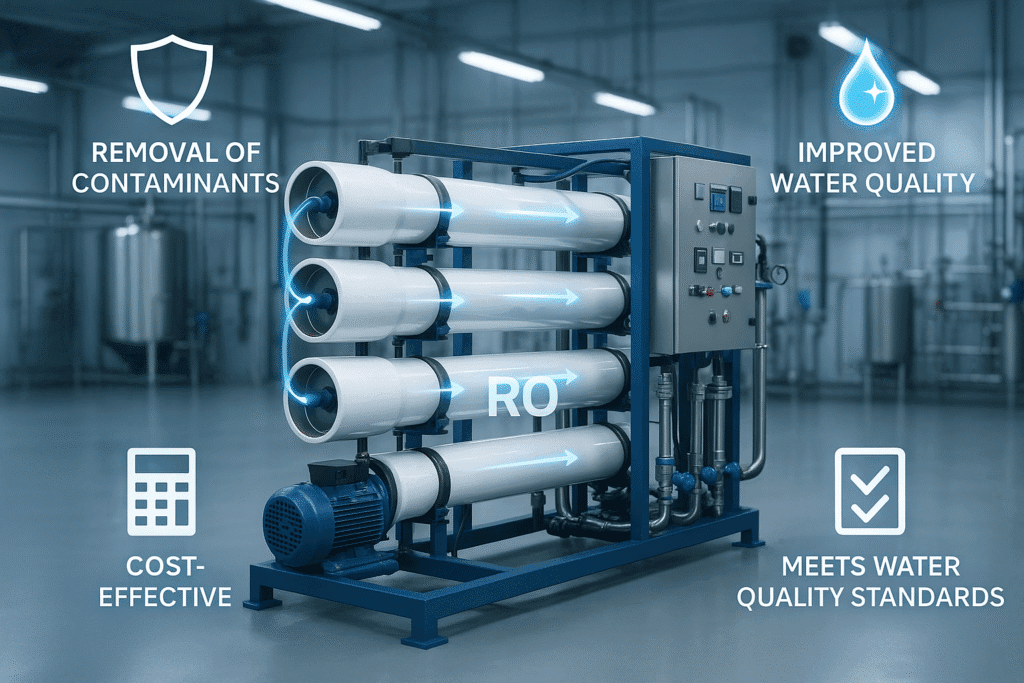
What are the benefits of using a Reverse Osmosis System for water treatment?
The benefits of Reverse Osmosis systems include:
- Removal of contaminants: Effectively filters out salts, bacteria, and heavy metals.
- Improved water quality: Provides high-quality water for various commercial and industrial uses.
- Cost-effective: Reduces water wastage and minimizes energy consumption.
- Compliance with standards: Ensures compliance with local and international water quality standards.
How long do Industrial RO plants typically last?
With proper maintenance, Industrial RO plants can last between 10 to 15 years. The lifespan depends on factors such as:
- Water quality: Higher TDS or mineral content may degrade components faster.
- Maintenance frequency: Regular cleaning and servicing extend plant life.
- Component quality: High-quality membranes and equipment last longer.
For more details on plant longevity, contact Dharmanandan Techno Projects Pvt. Ltd.
What is the difference between Reverse Osmosis and other water purification methods?
Reverse Osmosis is more efficient than other methods like filtration or distillation because:
- It removes a higher percentage of dissolved solids and contaminants.
- Energy-efficient: It uses less energy compared to distillation.
- Suitable for large-scale purification in industrial settings.
It is often preferred in industries where water quality must meet strict regulations, such as in pharmaceuticals or food processing.
How does a Commercial RO plant save on water wastage?
Commercial RO plants are designed to minimize water wastage by:
- Using high-efficiency membranes to maximize water recovery.
- Employing energy-efficient pumps and motors.
- Incorporating water recycling systems to treat and reuse the reject water in other processes.
Can an RO plant be scaled up as the business grows?
Yes, RO plants can be scaled up easily by:
- Adding more membranes to increase water capacity.
- Upgrading pumps and filtration systems as needed.
- Expanding the storage and packaging units for higher production volumes.
Scaling up is often necessary as businesses grow and water demand increases, especially in industries like bottled water.
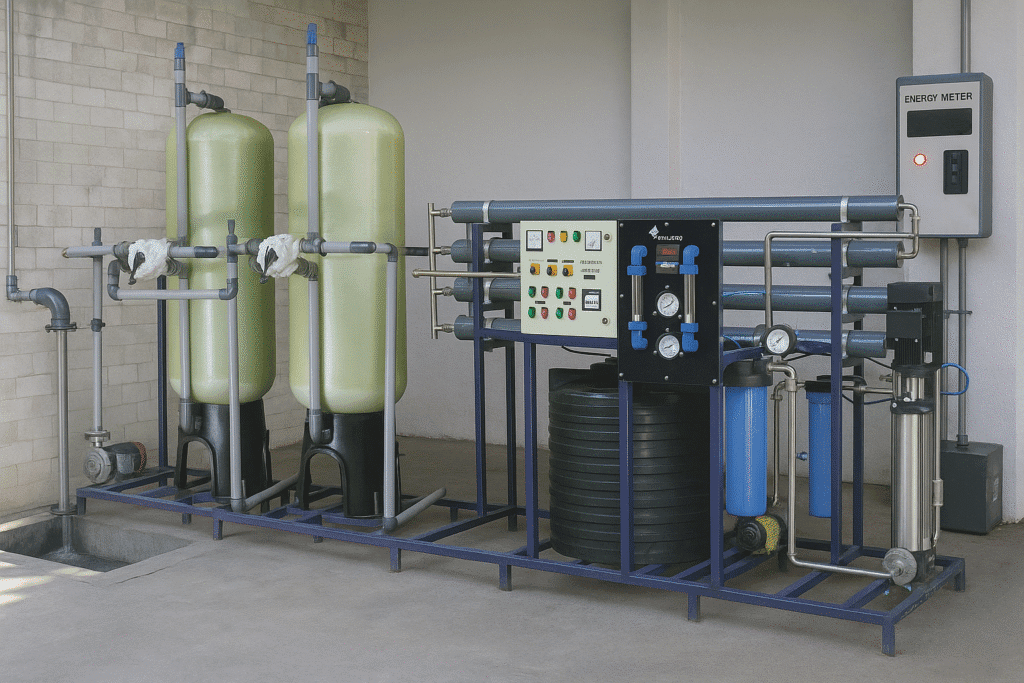
What are the environmental impacts of an Industrial RO Plant?
An Industrial RO plant has some environmental impacts, such as:
- Wastewater generation: RO plants produce reject water, which needs proper disposal or treatment.
- Energy consumption: RO systems require energy to run pumps and other machinery.
However, with proper design and operational practices, these impacts can be minimized through water recycling, energy-efficient systems, and waste management strategies.
Is there a need for a dedicated water treatment plant for large industries?
Yes, large industries require dedicated water treatment plants, as they often need large quantities of purified water for various processes. A Commercial RO plant helps meet these requirements by ensuring consistent water quality, reducing operational costs, and adhering to environmental standards.
How does an RO plant improve the efficiency of industrial processes?
RO plants improve industrial efficiency by:
- Providing consistent and high-quality water for production.
- Reducing scale formation in equipment, leading to longer lifespan and fewer breakdowns.
- Optimizing water usage by purifying and reusing water in various processes.
For further advice on improving operational efficiency, contact Dharmanandan Techno Projects Pvt. Ltd.
How much does it cost to set up an RO plant in India?
The cost of setting up an RO plant in India depends on several factors such as plant capacity, water quality, and location. It’s crucial to assess your specific requirements and consult with experts for a customized solution. For the best price and guidance on the setup, contact Dharmanandan Techno Projects Pvt. Ltd.
What factors influence the cost of setting up a commercial RO plant?
The cost of setting up a commercial RO plant is influenced by:
- Water source quality: Higher levels of contamination will require advanced filtration stages.
- Plant capacity: Larger plants require more complex infrastructure and equipment.
- Automation level: Fully automated systems tend to cost more.
- Location: Logistics, installation, and operational costs vary based on geographical location.
To get a more accurate cost of setting up a commercial RO plant, contact Dharmanandan Techno Projects Pvt. Ltd. for a detailed quote.
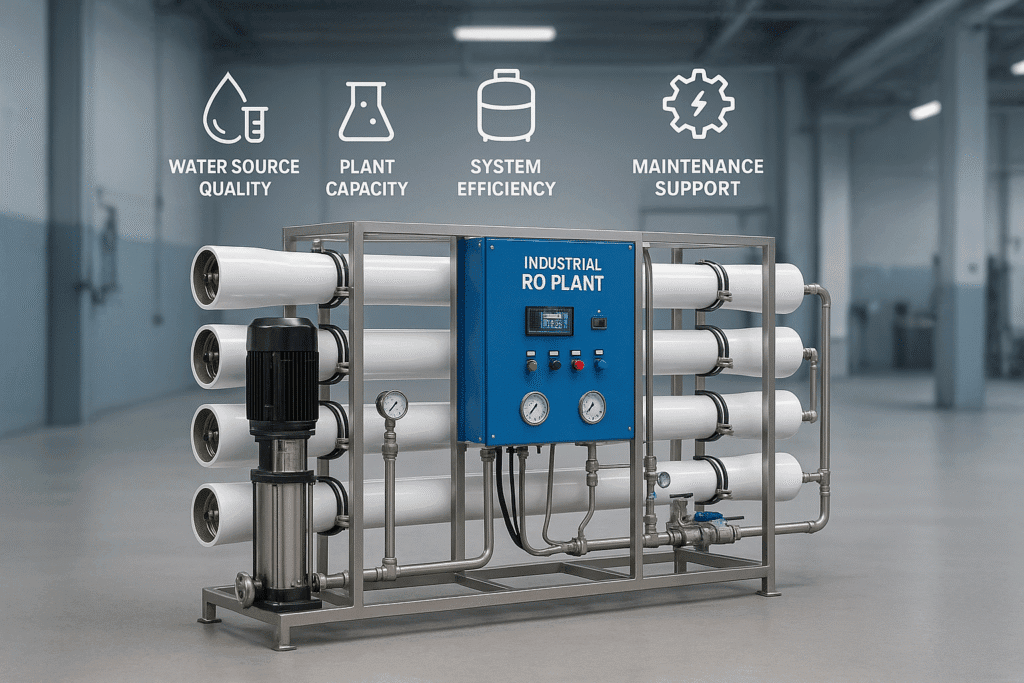
How do I choose the best quality industrial RO plant?
When choosing the best quality industrial RO plant, consider:
- Water source quality: Different plants are designed for different types of water (e.g., brackish, seawater, or freshwater).
- Plant capacity: Make sure the plant can handle your required volume.
- System efficiency: Look for energy-efficient systems with high recovery rates.
- Maintenance support: Opt for manufacturers offering long-term maintenance contracts.
For expert advice on selecting the best quality industrial RO plant, contact Dharmanandan Techno Projects Pvt. Ltd.
How do I calculate the investment required for an RO plant business?
Calculating the investment required for an RO plant business involves considering:
- Initial setup costs: Machinery, installation, and site preparation.
- Operational expenses: Energy, water treatment chemicals, and maintenance.
- Capital for inventory: For storing bottled water or packaging materials.
To get a customized business plan for RO plant investment, contact Dharmanandan Techno Projects Pvt. Ltd.
How can a business plan help in setting up an RO plant?
A business plan for an RO plant helps by:
- Estimating the initial investment and ongoing operational costs.
- Identifying the target market and potential revenue streams.
- Outlining the return on investment (ROI) and financial projections.
For expert assistance with your RO plant business plan, contact Dharmanandan Techno Projects Pvt. Ltd.
What is the cost of a 10,000-liter RO plant?
The cost of a 10,000-liter RO plant depends on several factors such as the water quality, plant capacity, and additional features required (such as pre-treatment or post-treatment systems). For accurate pricing tailored to your requirements, contact Dharmanandan Techno Projects Pvt. Ltd. for a detailed quote.
How does the cost of an industrial RO plant compare to a commercial RO plant?
Industrial RO plants typically cost more than commercial RO plants due to their larger capacity, additional filtration stages, and higher durability. Industrial plants are designed to handle higher volumes of water and more demanding operational environments, making them more expensive.
For a detailed cost comparison and pricing advice, contact Dharmanandan Techno Projects Pvt. Ltd.
How long does it take to set up a 10000 LPH RO plant?
The installation time for a 10000 LPH RO plant typically takes 4 to 6 weeks, depending on factors such as site preparation, plant customization, and local regulations. For a precise timeline based on your specific requirements, contact Dharmanandan Techno Projects Pvt. Ltd.
Can a 4000 LPH RO plant handle both brackish and seawater?
Yes, a 4000 LPH RO plant can be designed to handle both brackish and seawater, but it will require s specialized pre-treatment and high-pressure pumps to cope with the increased salinity levels. For customized solutions, contact Dharmanandan Techno Projects Pvt. Ltd. to discuss your water source and requirements.
Are there any energy-efficient options for large-scale RO plants?
Yes, there are energy-efficient RO plants available that use technologies like variable frequency drives (VFDs) for pumps and high-efficiency membranes. These systems are designed to reduce energy consumption while maintaining optimal performance.
For energy-efficient solutions, contact Dharmanandan Techno Projects Pvt. Ltd. for a personalized consultation.
Setting up a commercial or industrial RO plant requires careful planning, investment, and ongoing maintenance. Whether you are establishing a mineral water plant, bottled water business, or industrial water treatment system, it’s important to assess your water needs, budget, and operational goals. For the best solutions and pricing, we recommend contacting Dharmanandan Techno Projects Pvt. Ltd. to ensure you get the right RO system for your requirements.
If you have more specific queries about RO plant setup or need a customized solution, contact Dharmanandan Techno Projects Pvt. Ltd. for expert guidance and the best pricing.
About Author
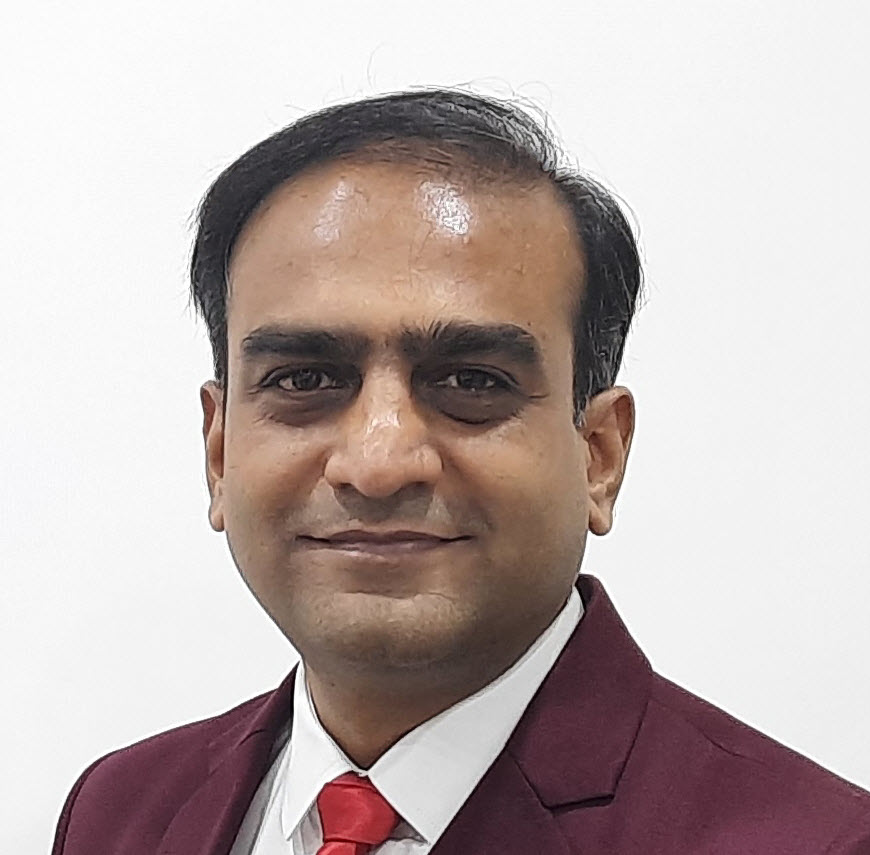
Director – Global Marketing and Sales
Mr. Bhavesh from Dharmanandan Techno Projects Pvt. Ltd. has played a pivotal role in elevating the DTPPL brand to the global stage, leveraging his exceptional expertise in marketing and communications. He is committed to helping clients achieve significant growth while strengthening their own brands. Dharmanandan Techno Projects Pvt. Ltd. is a leading manufacturer and supplier of water purification systems and turnkey solutions for mineral water plants. With years of experience in designing and delivering high-quality water treatment solutions, the company provides end-to-end services, including system design, installation, maintenance, and ongoing support. Specializing in scalable and customizable water plants, DTPPL has successfully served industries worldwide, ensuring clean and safe drinking water across diverse applications.




